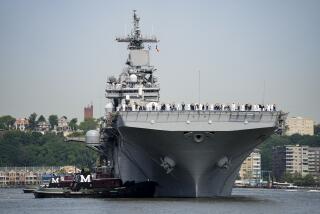U.S. Carriers Sail Toward Gulf of Sidra; Libya Sanctions Modified for Businesses
- Share via
WASHINGTON — Stepping up pressure on Libyan leader Moammar Kadafi, two U.S. aircraft carriers hastily cut short port calls and sailed early Friday for waters in the area of the Gulf of Sidra as they prepared for possible aerial exercises in the continuing war of nerves with the Tripoli regime, Pentagon sources said.
The carrier Saratoga broke off a visit to Trieste, Italy, and the carrier Coral Sea, in port in Naples, headed south toward the central Mediterranean Sea under orders to renew operations, accompanied by only some of their escort ships.
At the same time, the Reagan Administration on Friday modified the sanctions it has placed on businesses operating in Libya, giving some of them extra time to close their operations to prevent a windfall as great as $6 billion in abandoned assets and equipment from falling into Kadafi’s hands.
Maneuvers Over
The Saratoga and the Coral Sea had been in port for several days, after completing a weeklong exercise near the Gulf of Sidra. Those maneuvers were intended to assert the United States’ resolve to operate freely in what it considers international waters.
In that exercise, the ships were said to have stayed just north of the gulf, and the aircraft launched by the carriers avoided airspace over the gulf, which is claimed by Libya. Pentagon sources said they are unsure whether the American forces, operating under new orders, would continue to remain outside the disputed body of water.
The United States began increasing pressure on Kadafi in response to what it says is his support for international terrorism in general and, in particular, the assistance it says he gave those responsible for the Palestinian attacks on Dec. 27 at airports in Vienna and Rome. A total of 20 people, including five Americans, were killed in the violence.
The Pentagon sources, speaking on the condition that they not be identified, said the two aircraft carriers had not been scheduled to leave port until Sunday. Instead, they sailed before 7 a.m. Friday.
Hours later, Kadafi threatened to divert Israeli airliners to his landing fields in retaliation for the Israeli interception Tuesday of a Libyan private jet erroneously thought to be carrying Palestinian leaders.
Minimized by Pentagon
Kadafi’s threat was soft-pedaled at the Pentagon, where officials questioned whether the Soviet-built MIGs in the Libyan air force have sufficient range to reach Israeli flights, well to the north. In addition, Israeli passenger planes are believed to possess countermeasures to protect them from missiles.
Meanwhile, the State and Treasury departments announced Friday that U.S. companies under Administration orders to close their facilities in Libya would, under strict conditions, be given extra time to phase out their operations. Without the extension, it is feared that Kadafi could benefit from a $1- to $6-billion windfall of abandoned assets and equipment.
In a separate action, the State Department announced that U.S. citizens married to Libyan nationals generally would be granted permission to remain in the country and carry out “transactions . . . necessary to the conduct of their livelihood in Libya.”
Under the extension rules, which apply primarily to the five U.S. oil companies operating in Libya, the firms must begin a serious effort to wind up all operations, including the selling off of assets, “as soon as practicable.”
As an incentive, any profits earned by the companies after Feb. 1, when the economic sanctions became effective, would be held in an escrow account under U.S. government control. In addition, the companies would have to report back to the Treasury Department “on a frequent periodic basis” on the progress of their negotiations toward pulling out of Libya completely.
Better Market Leverage
At the same time, according to officials who briefed reporters on condition that they not be named, the American action last month to freeze several hundred million dollars in Libyan assets in the United States would give the companies some leverage toward getting a fair price for the assets they sell.
“We have now frozen hundreds of millions of (Kadafi’s) dollars as an insurance against (a) fire sale situation. . . ,” one official said. “We think the freezing of the assets does give us a considerable leverage.”
In addition, the companies would only be permitted to sell assets to European operators or other third parties on condition that the equipment is shipped out of Libya, not to be used there.
The estimated value of property of the five oil companies in Libya is at least $1 billion, but because service and equipment companies are also involved, officials said, the total possible windfall that Kadafi could reap ranges as high as $6 billion.
The oil firms--Occidental, Amerada Hess, Marathon, Conoco and Grace Petroleum--have been primarily engaged in shipping oil produced by the Libyan government itself. Libya nationalized its oil assets some time ago and took over all oil-field production after President Reagan announced the sanctions Jan. 8.
More to Read
Sign up for Essential California
The most important California stories and recommendations in your inbox every morning.
You may occasionally receive promotional content from the Los Angeles Times.













